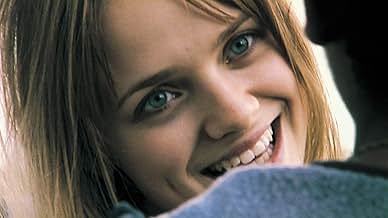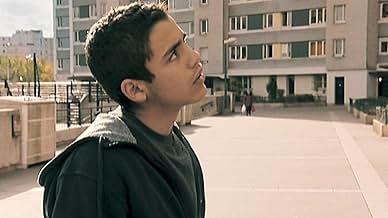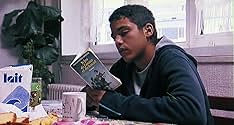IMDb RATING
6.9/10
3.3K
YOUR RATING
Krimo a 15 years old shy boy falls in love for Lídia who is his classmate.To be able to assume his love for her he decides to take a part in the play that was to be one of his friends.Krimo a 15 years old shy boy falls in love for Lídia who is his classmate.To be able to assume his love for her he decides to take a part in the play that was to be one of his friends.Krimo a 15 years old shy boy falls in love for Lídia who is his classmate.To be able to assume his love for her he decides to take a part in the play that was to be one of his friends.
- Awards
- 16 wins & 5 nominations total
Meriem Serbah
- Krimo's Mother
- (as Meryem Serbah)
Featured reviews
I'm going to keep it short.
To be honest I didn't want to see this film, however I had to go so a movie at a film festival for my international cinema class. When I left it was one of those experiences where you want to truly thank a teacher for making you do something. Altogether this was a great movie, yes it was long, however the director captured the real emotions and nuances of teens in love so amazingly you feel like he stole the performances from the young actors. Not to mention this movie gives a great view of the hardships for minorities in the south of France, by not directly addressing them.
Check this movie out, no matter what you won't be mad that you saw it.
To be honest I didn't want to see this film, however I had to go so a movie at a film festival for my international cinema class. When I left it was one of those experiences where you want to truly thank a teacher for making you do something. Altogether this was a great movie, yes it was long, however the director captured the real emotions and nuances of teens in love so amazingly you feel like he stole the performances from the young actors. Not to mention this movie gives a great view of the hardships for minorities in the south of France, by not directly addressing them.
Check this movie out, no matter what you won't be mad that you saw it.
I really did like this film! - those viewers, French or otherwise, who have seen, and been able to follow the sound track of La Haine, will be quite at home in this environment, will know what to expect, and will be sensitive to the message the film conveys. True, it may lack the sort of 'excitement'that some film-goers may seek, but one has to take it for what it is: a hard-hitting social document which will resonate with many who are familiar with the inner-city tensions found in many French towns in recent years. The gambit of choosing amateur actors worked very well,in my opinion, a point which other viewers seem to echo.
"Games of Love and Chance (L'Esquive)" is an involving experiment in giving classic French comedy of errors relevance to today, in a dramatic demonstration of "Plus ça change, plus c'est la meme chose" -- the more things change, the more they stay the same.
Writer/director Abdellatif Kechiche juxtaposes the titular 18th century work by Marivaux with junior high kids in a poor, inner city Arab immigrant neighborhood, for an effect that crosses Larry Clark's "Kids" with "Mad Hot Ballroom." Like any period farce, the real relationships are dizzyingly circular: A loves B who loves C who is in disguise with D. A threatens C, B changes places with D to pursue his suit and use Marivaux like Cyrano, C can't make up her mind, friends of B and C misunderstand everyone, and the course of true love doesn't run smooth.
While marred by wincingly heavy-handed intellectualizing on class social criticism by the literature teacher who is directing the kids in the play and a deus ex machina insertion of biased cops, the frank life and death-ness of adolescent romance strongly comes through in comparison to Marivaux's mannered floweriness, even as these kids communicate amongst each other with four letter obscenities, bluntly crude slang (that may not be too well represented in the English subtitles but I'm sure French subtitlers likewise have trouble with the patois in movies such as "Four Brothers"), heart-tugging looks of longing, painfully hurt tears, and, finally in frustration, physical action.
It is not clear if "the blonde" as she is referred to in the English subtitles (played by the excellent Sara Forestier, who seems to have been the only member of the cast with some previous experience before the cameras) is also from an immigrant family or Muslim, or if she just picked up use of a couple of Muslim catch phrases in her slang as to whether Kechiche is adding another layer of social commentary. Or she could just be part of the trend in French cinema to fixate on pouty young blonde temptresses, viz. "La Petite Lili," "À Tout de Suite (Right Now)," "Lila Says (Lila dit ça)."
This film has a lot of parallels with "Lila Says (Lila dit ça)," not just about sex and social setting, though it dealt with older kids, but also how literature can be an escapist outlet yet also a threat that brings hidden emotions to the fore.
The grim mise en scene makes wonderful use of a crowded, high rise neighborhood where the kids hang out chilled because they have little privacy at home, some fathers are in jail, their loving mothers try to keep tabs on them, and cell phones are their expensive lifelines.
While the film goes on a bit too long as scenes meander, probably because it isn't clear how much has been scripted and how much the kids are very effectively improvising particulars around a basic story line, their relationships are enthralling, both the romances and the friendships. Each teen actor creates an indelible and different character.
270 years since Marivaux and the human heart hasn't changed.
Writer/director Abdellatif Kechiche juxtaposes the titular 18th century work by Marivaux with junior high kids in a poor, inner city Arab immigrant neighborhood, for an effect that crosses Larry Clark's "Kids" with "Mad Hot Ballroom." Like any period farce, the real relationships are dizzyingly circular: A loves B who loves C who is in disguise with D. A threatens C, B changes places with D to pursue his suit and use Marivaux like Cyrano, C can't make up her mind, friends of B and C misunderstand everyone, and the course of true love doesn't run smooth.
While marred by wincingly heavy-handed intellectualizing on class social criticism by the literature teacher who is directing the kids in the play and a deus ex machina insertion of biased cops, the frank life and death-ness of adolescent romance strongly comes through in comparison to Marivaux's mannered floweriness, even as these kids communicate amongst each other with four letter obscenities, bluntly crude slang (that may not be too well represented in the English subtitles but I'm sure French subtitlers likewise have trouble with the patois in movies such as "Four Brothers"), heart-tugging looks of longing, painfully hurt tears, and, finally in frustration, physical action.
It is not clear if "the blonde" as she is referred to in the English subtitles (played by the excellent Sara Forestier, who seems to have been the only member of the cast with some previous experience before the cameras) is also from an immigrant family or Muslim, or if she just picked up use of a couple of Muslim catch phrases in her slang as to whether Kechiche is adding another layer of social commentary. Or she could just be part of the trend in French cinema to fixate on pouty young blonde temptresses, viz. "La Petite Lili," "À Tout de Suite (Right Now)," "Lila Says (Lila dit ça)."
This film has a lot of parallels with "Lila Says (Lila dit ça)," not just about sex and social setting, though it dealt with older kids, but also how literature can be an escapist outlet yet also a threat that brings hidden emotions to the fore.
The grim mise en scene makes wonderful use of a crowded, high rise neighborhood where the kids hang out chilled because they have little privacy at home, some fathers are in jail, their loving mothers try to keep tabs on them, and cell phones are their expensive lifelines.
While the film goes on a bit too long as scenes meander, probably because it isn't clear how much has been scripted and how much the kids are very effectively improvising particulars around a basic story line, their relationships are enthralling, both the romances and the friendships. Each teen actor creates an indelible and different character.
270 years since Marivaux and the human heart hasn't changed.
This movie is getting fresh exposure in France thanks to its win at Les Césars, or the "French Oscars" as other countries like to call them. Its success will probably mean that it now gets exposure outside the country, too, and I wonder how successfully.
Though an accurate and contemporary examination of France, the film's world is a foreign one, even to many people living here--the specificity of the setting (the projects, in a "suburb" of Paris), the language (rapid-fire, slangy, "vulgar", and peppered with "verlan", a street language of inverted syllables--the word itself could translate as "wardsback", and how anyone will translate this dialogue I have no idea), and the behavior (mostly arguing--strident, pushy, beautifully repetitive) may not play clearly outside of France. I'm not sure how clearly it plays here, or how willing people are to watch it, especially as it turns the idea of the scary bad French projects somewhat on its ear.
This isn't a criticism of the movie; on the contrary. Kechiche has shot a riveting cross-section of teenagers growing up in social housing, in broken homes and poverty, who lack the tools of expression, and who have adopted the posturing of the wounded (and, in the story, almost entirely absent) adults who raise them, attacking (the movie unfolds at a near-constant level of verbal aggression) and dodging ("esquiver" means "to dodge" or "to evade") one another's attacks with all they can muster.
The film's intensely political side feels almost accidental; in its unfolding, it has great heart, and its actors, who are apparently mostly amateurs from around the shooting location, are outstanding. On the whole, it reminded me a great deal of David Gordon Green's George Washington: a simple love story set against a landscape of poverty, played out frankly and honestly, allowed to unfold at a distinctly un-Hollywoodian rhythm. If Green's film is more beautiful cinematic ally, L'Esquive is more concentrated, more unflinching in its examination of the deep repercussions and violence of economic, social, and familial hardship. Its statement that France is no longer a country of the French-of-French-ancestry, and that its refusal to accept its own transformation does not mean its lost generation accepts its loss, could not be more clearly nor more poignantly made.
Without spoiling or going into detail, there are things about the plot that are implausible, things that probably hurt the film overall, but watching this movie for plot is like watching Ocean's Eleven for social insight. This is a positive study of character in a bad situation, of a stratum of society rarely filmed and still more rarely treated as fairly as it is offered up here, beautifully and eloquently.
Though an accurate and contemporary examination of France, the film's world is a foreign one, even to many people living here--the specificity of the setting (the projects, in a "suburb" of Paris), the language (rapid-fire, slangy, "vulgar", and peppered with "verlan", a street language of inverted syllables--the word itself could translate as "wardsback", and how anyone will translate this dialogue I have no idea), and the behavior (mostly arguing--strident, pushy, beautifully repetitive) may not play clearly outside of France. I'm not sure how clearly it plays here, or how willing people are to watch it, especially as it turns the idea of the scary bad French projects somewhat on its ear.
This isn't a criticism of the movie; on the contrary. Kechiche has shot a riveting cross-section of teenagers growing up in social housing, in broken homes and poverty, who lack the tools of expression, and who have adopted the posturing of the wounded (and, in the story, almost entirely absent) adults who raise them, attacking (the movie unfolds at a near-constant level of verbal aggression) and dodging ("esquiver" means "to dodge" or "to evade") one another's attacks with all they can muster.
The film's intensely political side feels almost accidental; in its unfolding, it has great heart, and its actors, who are apparently mostly amateurs from around the shooting location, are outstanding. On the whole, it reminded me a great deal of David Gordon Green's George Washington: a simple love story set against a landscape of poverty, played out frankly and honestly, allowed to unfold at a distinctly un-Hollywoodian rhythm. If Green's film is more beautiful cinematic ally, L'Esquive is more concentrated, more unflinching in its examination of the deep repercussions and violence of economic, social, and familial hardship. Its statement that France is no longer a country of the French-of-French-ancestry, and that its refusal to accept its own transformation does not mean its lost generation accepts its loss, could not be more clearly nor more poignantly made.
Without spoiling or going into detail, there are things about the plot that are implausible, things that probably hurt the film overall, but watching this movie for plot is like watching Ocean's Eleven for social insight. This is a positive study of character in a bad situation, of a stratum of society rarely filmed and still more rarely treated as fairly as it is offered up here, beautifully and eloquently.
The life of a band of teenager in a suburb near Paris. But instead of showing what would be the "urban legend" of this kind of poor suburb (violence, rapes...), Abdelatif Kechiche shows us what's the daily life of those guys: not much to do, not much dreams. Still, some of them have fun rehearsing for a play. Among those "players", Lydia, long time friend of Krimo... And Krimo, a bit shy, finds himself in love with this joyful girl. The good thing in this movie is that it shows the suburb as it can be : not really fun but not the awful thing we think it is. No, they're not all juvenile delinquents. Their lives are just no fun. And yes, they don't speak like Moliere did, yes they use F words. It's the way they talk to each other. But when talking to adults, they're just very polite. And even if there's no much suspense in this movie (it's just about wondering if Krimo will go out with Lydia), L'Esquive shows another suburb. A suburb where teenagers (all french, but from different origins, from Spain to Asia) are not dangerous people.
Did you know
- TriviaThe movie is dedicated Slaheddine.
- ConnectionsReferenced in Leçon de cinéma: Arnaud Desplechin et Mathieu Amalric (2019)
- SoundtracksWarini Werak Tergoud
Performed by Cheba Zahouania
Written and Composed by Cheikha Rimitti
Production: MLP / History
- How long is Games of Love and Chance?Powered by Alexa
Details
- Release date
- Country of origin
- Language
- Also known as
- Votre bouche avec la mienne
- Filming locations
- Saint-Denis, Seine-Saint-Denis, France(Cité des Francs-Moisins: housing complex, Rue du M.al Lyautey: police control)
- Production companies
- See more company credits at IMDbPro
Box office
- Gross US & Canada
- $8,085
- Opening weekend US & Canada
- $2,529
- Sep 4, 2005
- Gross worldwide
- $1,747,263
- Runtime1 hour 57 minutes
- Color
- Sound mix
- Aspect ratio
- 1.85 : 1
Contribute to this page
Suggest an edit or add missing content
























